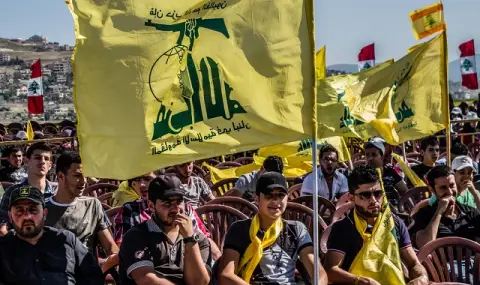"Hezbollah" is going through the most difficult period since the creation of the Lebanese Shiite organization in 1982, he wrote in a commentary article for "Ash Sharq al-Awsat" the Lebanese political journalist and TV presenter Nadim Quteish, who is currently the General Manager of the TV "Sky News Arabia" (Sky News Arabia), writes BTA.
In his words, in less than a year, the group's leadership structure, military capabilities and operational efficiency have fallen into a deep crisis that raises serious questions about its future in Lebanon and the region.
First of all, infiltrating the communication networks of "Hezbollah" is a severe blow to this system key to the organization, without which no combat force could conduct a conflict, the author points out. Israel was able to gain access to the movement's cell phones and eliminate many of its military leaders. After the assassination of senior commander Fuad Shukr, it became clear that Israeli services had penetrated even the private ground communication network of "Hezbollah" - the same one the group waged a "mini war" to preserve in 2008.
The most decisive blow was when Israel tricked "Hezbollah" to a deal to buy thousands of mined pagers, most of which exploded in the hands of their users within less than 30 minutes, seriously injuring a large number of agents and official members, Kuteish noted. This breakthrough allowed to establish the location of important figures such as the commander of the elite forces "Ar Radwan" Ibrahim Akil, who was injured in the operation. He was identified after Israel accessed the security cameras of the hospital where he was treated, and after his discharge was tracked to a southern suburb of Beirut, where he held his last meeting 24 hours later.
According to Kuteish, the scale of the collapse of the secure communications of "Hezbollah" is incredible. Even without accounting for injuries and loss of life, this collapse leaves it unable to engage in direct conflict with Israel. By bombing Aqeel's meeting place, Israel has shown that the group is in a state of chaos and that it has lost its operational effectiveness and command and control capabilities.
Secondly, destroying the communications of "Hezbollah" has allowed Israel to launch devastating pre-emptive strikes on the movement's military infrastructure, including weapons depots, missile launchers, fortified positions, and drone and missile assembly factories. The most notable attack is the attack on August 25, when about a hundred Israeli fighter jets destroyed thousands of rocket launchers of "Hezbollah" that were going to be used for attacks on the northern and central part of Israel in response to the liquidation of Fuad Shukr, the journalist points out. According to him, although it launched rockets on the outskirts of Haifa, "Hezbollah" has completely lost the initiative, and Israel has raised the stakes to a whole new level.
The third most painful blow is the systematic liquidation by Israel of leaders and important cadres of "Hezbollah". The Israeli army released an image of the group's leadership structure, saying it had lost about 70 percent (6 out of 9) of its military commanders. Also killed were hundreds of operatives who are responsible for important activities such as drone attacks, cyber warfare, special coordination, the management of combat operations on the ground.
Nadim Kuteish believes that "Hezbollah" is experiencing a massive strategic vacuum that will be difficult to fill in the near future. This not only weakens the group's effectiveness, but also destroys its morale and strategic vision.
As a result "Hezbollah" is in the worst situation since its creation so far. Its communications networks are compromised, its military infrastructure is destroyed, and it is losing leaders and personnel. The blows he suffered in recent weeks are more severe than any blows in the last few decades, Kuteish concludes. According to him, this raises the question of its future, its role in Lebanon and its position among its allies and enemies in the Middle East.
